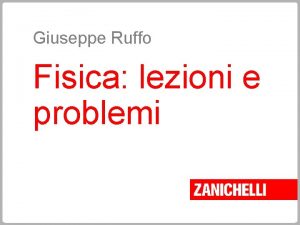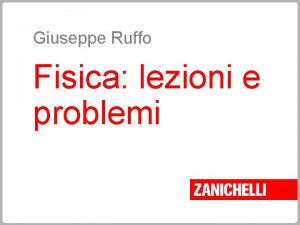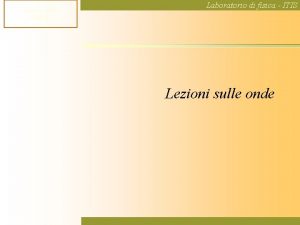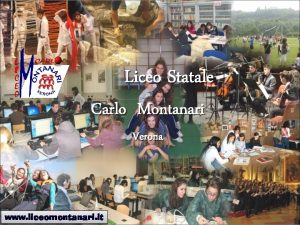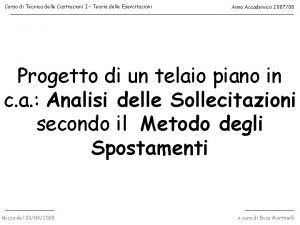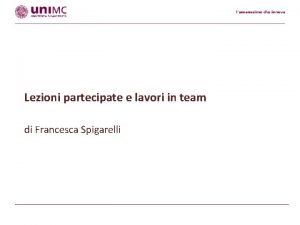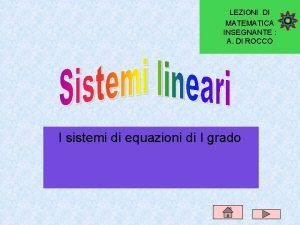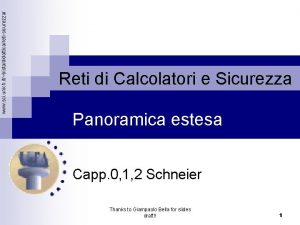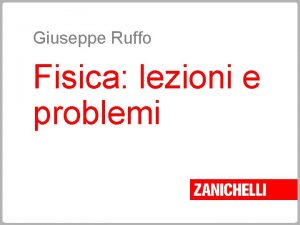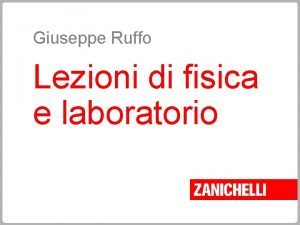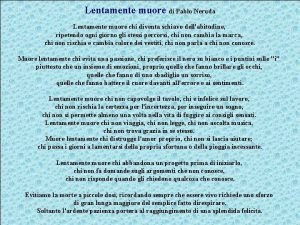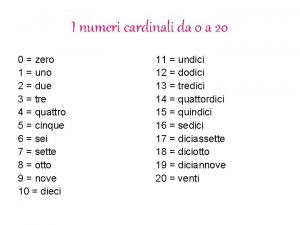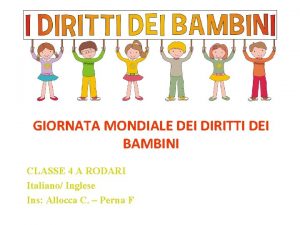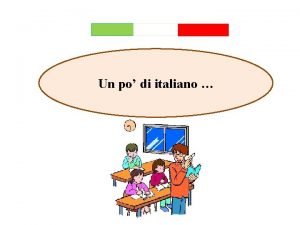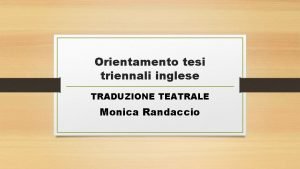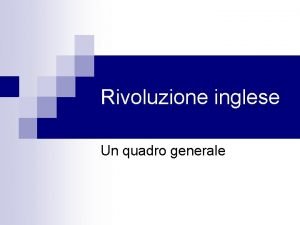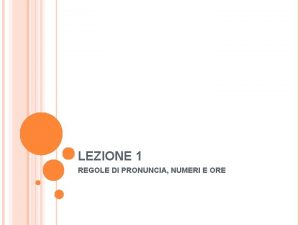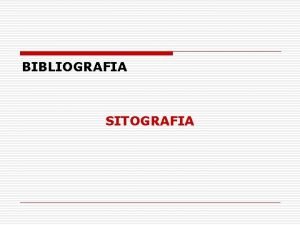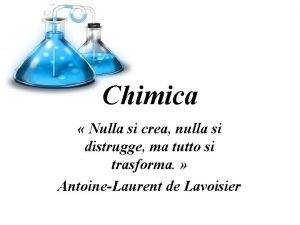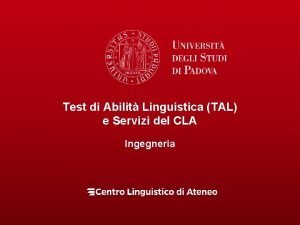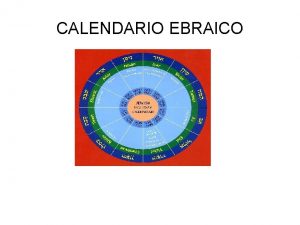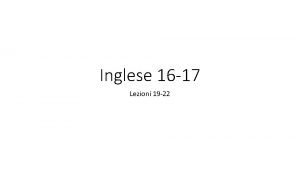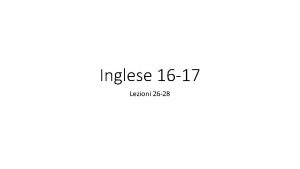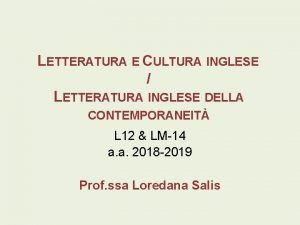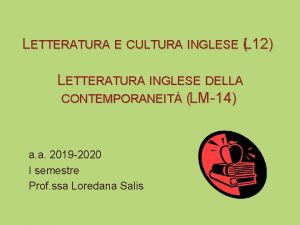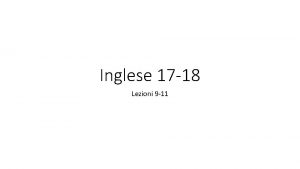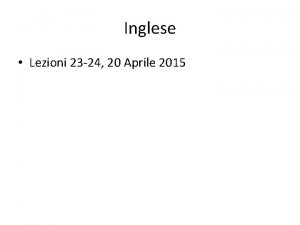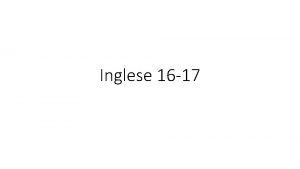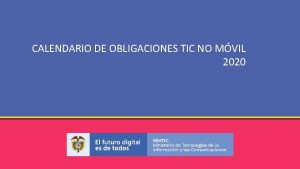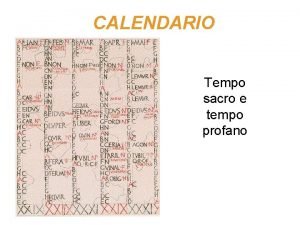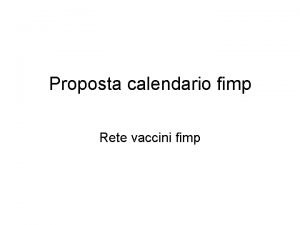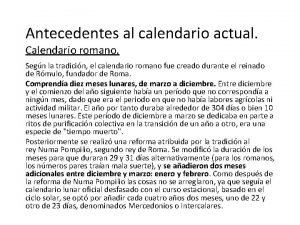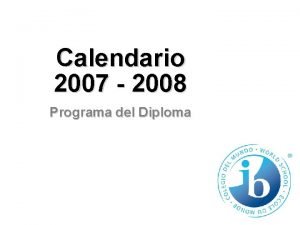Inglese 16 17 Lezioni 23 24 291116 Calendario




![L’argomentazione di Hume • [1] Unluckily all these positive assertions are contrary to that L’argomentazione di Hume • [1] Unluckily all these positive assertions are contrary to that](https://slidetodoc.com/presentation_image_h2/a2818d22b9f39340a65f3799c3b96998/image-5.jpg)
![• [3] and yet ’tis a question, which must necessarily be answer’d, if • [3] and yet ’tis a question, which must necessarily be answer’d, if](https://slidetodoc.com/presentation_image_h2/a2818d22b9f39340a65f3799c3b96998/image-6.jpg)
![• [4] It must be some one impression, that gives rise to every • [4] It must be some one impression, that gives rise to every](https://slidetodoc.com/presentation_image_h2/a2818d22b9f39340a65f3799c3b96998/image-7.jpg)
![• [6] If any impression gives rise to the idea of self, that • [6] If any impression gives rise to the idea of self, that](https://slidetodoc.com/presentation_image_h2/a2818d22b9f39340a65f3799c3b96998/image-8.jpg)
![• [10] It cannot, therefore, be from any of these impressions, or from • [10] It cannot, therefore, be from any of these impressions, or from](https://slidetodoc.com/presentation_image_h2/a2818d22b9f39340a65f3799c3b96998/image-9.jpg)

![• Conclusione da raggiungere: • Non abbiamo un’idea del sé • [1] Unluckily • Conclusione da raggiungere: • Non abbiamo un’idea del sé • [1] Unluckily](https://slidetodoc.com/presentation_image_h2/a2818d22b9f39340a65f3799c3b96998/image-11.jpg)
![• Dimostrazione • Tutte le idee derivano da impressioni • [4] It must • Dimostrazione • Tutte le idee derivano da impressioni • [4] It must](https://slidetodoc.com/presentation_image_h2/a2818d22b9f39340a65f3799c3b96998/image-12.jpg)



![• Quindi, se ci fosse l’impressione del sé sarebbe invariabile • [6] If • Quindi, se ci fosse l’impressione del sé sarebbe invariabile • [6] If](https://slidetodoc.com/presentation_image_h2/a2818d22b9f39340a65f3799c3b96998/image-16.jpg)



![• 1. Tutte le idee derivano da impressioni (assioma empirista, [4] ) • • 1. Tutte le idee derivano da impressioni (assioma empirista, [4] ) •](https://slidetodoc.com/presentation_image_h2/a2818d22b9f39340a65f3799c3b96998/image-20.jpg)
















- Slides: 36

Inglese 16 -17

• Lezioni 23 -24 • 29/11/16

Calendario • Lunedì 5 Dicembre: Diana - Laura; Hobbes, De corpore, parti scelte per esporre l'esempio topico della nave di Teseo; Martedì 6 Dicembre: Paolo - Federica; Hume, A Treatise of Human Nature, parti scelte per l'analisi della concezione humiana del tempo; • Roberto - Helvio; Hume, A Treatise of Human Nature, argomento ancora da delineare; • • Lunedì 12 Dicembre: Anna - Erica; Butler, The Analogy of Religion, argomento ancora da delineare; • • Marika - Angela; Russel, opera ed argomento ancora da delineare. •

Passo già letto alla fine della lezione scorsa • There are some philosophers, who imagine we are every moment intimately conscious of what we call our Self; that we feel its existence and its continuance in existence; and are certain, beyond the evidence of a demonstration, both of [0] its perfect identity and simplicity. The strongest sensation, the most violent passion, say they, instead of distracting us from this view, only fix it the more intensely, and make us consider their influence on self either by their pain or pleasure. To attempt a farther proof of this were to weaken its evidence; since no proof can be deriv’d from any fact, of which we are so intimately conscious; nor is there any thing, of which we can be certain, if we doubt of this.
![Largomentazione di Hume 1 Unluckily all these positive assertions are contrary to that L’argomentazione di Hume • [1] Unluckily all these positive assertions are contrary to that](https://slidetodoc.com/presentation_image_h2/a2818d22b9f39340a65f3799c3b96998/image-5.jpg)
L’argomentazione di Hume • [1] Unluckily all these positive assertions are contrary to that very experience, which is pleaded for them, nor have we any idea of self [conclusione da raggiungere], after the manner it is here explain’d. • [2] For from what impression cou’d this idea be deriv’d? This question ’tis impossible to answer without a manifest contradiction and absurdity;
![3 and yet tis a question which must necessarily be answerd if • [3] and yet ’tis a question, which must necessarily be answer’d, if](https://slidetodoc.com/presentation_image_h2/a2818d22b9f39340a65f3799c3b96998/image-6.jpg)
• [3] and yet ’tis a question, which must necessarily be answer’d, if we wou’d have the idea of self pass for clear and intelligible.
![4 It must be some one impression that gives rise to every • [4] It must be some one impression, that gives rise to every](https://slidetodoc.com/presentation_image_h2/a2818d22b9f39340a65f3799c3b96998/image-7.jpg)
• [4] It must be some one impression, that gives rise to every real idea. • [5] But self or person is not any one impression, but [5’] that to which our several impressions and ideas are suppos’d to have a reference (v. passo [0]).
![6 If any impression gives rise to the idea of self that • [6] If any impression gives rise to the idea of self, that](https://slidetodoc.com/presentation_image_h2/a2818d22b9f39340a65f3799c3b96998/image-8.jpg)
• [6] If any impression gives rise to the idea of self, that impression must continue invariably the same, thro’ the whole course of our lives; • [7] since self is suppos’d to exist after that manner. • [8] But there is no impression constant and invariable. • [9] Pain and pleasure, grief and joy, passions and sensations succeed each other, and never all exist at the same time.
![10 It cannot therefore be from any of these impressions or from • [10] It cannot, therefore, be from any of these impressions, or from](https://slidetodoc.com/presentation_image_h2/a2818d22b9f39340a65f3799c3b96998/image-9.jpg)
• [10] It cannot, therefore, be from any of these impressions, or from any other, that the idea of self is deriv’d; • Conclusione ripetuta: • [11] and consequently there is no such idea.

• Proviamo a ricostruire l’argomento di Hume volto a dimostrare che non abbiamo alcuna idea del sé
![Conclusione da raggiungere Non abbiamo unidea del sé 1 Unluckily • Conclusione da raggiungere: • Non abbiamo un’idea del sé • [1] Unluckily](https://slidetodoc.com/presentation_image_h2/a2818d22b9f39340a65f3799c3b96998/image-11.jpg)
• Conclusione da raggiungere: • Non abbiamo un’idea del sé • [1] Unluckily all these positive assertions are contrary to that very experience, which is pleaded for them, nor have we any idea of self, after the manner it is here explain’d. • [11] and consequently there is no such idea.
![Dimostrazione Tutte le idee derivano da impressioni 4 It must • Dimostrazione • Tutte le idee derivano da impressioni • [4] It must](https://slidetodoc.com/presentation_image_h2/a2818d22b9f39340a65f3799c3b96998/image-12.jpg)
• Dimostrazione • Tutte le idee derivano da impressioni • [4] It must be some one impression, that gives rise to every real idea. • …

• Quindi se ci fosse l’idea del sé sarebbe derivata da un’impressione • [3] and yet ’tis a question [from what impression cou’d this idea be deriv’d? ], which must necessarily be answer’d, if we wou’d have the idea of self pass for clear and intelligible.

• Ma non c’è un’impressione che può candidarsi a questo ruolo (“impressione del sé”) • Perché non c’è una tale impressione? • Il sé non è una qualsiasi impressione tra le altre • [5] But self or person is not any one impression,

• Perché? È il punto di riferimento per tutte le impressioni (lungo tutto il corso della vita) • [7] since self is suppos’d to exist after that manner. • [5’] [self is] that to which our several impressions and ideas are suppos’d to have a reference. (v. passo [0])
![Quindi se ci fosse limpressione del sé sarebbe invariabile 6 If • Quindi, se ci fosse l’impressione del sé sarebbe invariabile • [6] If](https://slidetodoc.com/presentation_image_h2/a2818d22b9f39340a65f3799c3b96998/image-16.jpg)
• Quindi, se ci fosse l’impressione del sé sarebbe invariabile • [6] If any impression gives rise to the idea of self, that impression must continue invariably the same, thro’ the whole course of our lives;

• Ma non ci sono impressioni invariabili lungo tutto il corso della vita • [8] But there is no impression constant and invariable. • Perchè? Le impressioni di cui siamo consapevoli sono in continuo cambiamento • [9] Pain and pleasure, grief and joy, passions and sensations succeed each other, and never all exist at the same time.

• Quindi, nessuna di queste impressioni può far sorgere l’idea del sé • [10] It cannot, therefore, be from any of these impressions, or from any other, that the idea of self is deriv’d;

L’argomento ricostruito
![1 Tutte le idee derivano da impressioni assioma empirista 4 • 1. Tutte le idee derivano da impressioni (assioma empirista, [4] ) •](https://slidetodoc.com/presentation_image_h2/a2818d22b9f39340a65f3799c3b96998/image-20.jpg)
• 1. Tutte le idee derivano da impressioni (assioma empirista, [4] ) • 2. se ci fosse l’idea del sé sarebbe derivata da un’impressione (da 1, [3] ) • 3. l’impressione “candidata” (da cui deriverebbe l’idea del sé ) sarebbe il punto di riferimento di tutte le altre impressioni lungo il corso della vita (concezione del sé, [0], [5’], [7]) • 4. Se ci fosse l’impressione candidata sarebbe invariabile (da 3, [6] ) • 5. osserviamo impressioni in continuo mutamento (dato introspettivo, [9]) • 6. Non ci sono impressioni invariabili (generalizzazione da 5, [8]) • 7. non c’è un’impressione candidata (da 6 e 4, [10]) • 8. Non c’è l’idea del sé (da 2 e 7, [1], [11])

• Continuiamo a leggere da Book I, part IV, sect. 6 del Treatise di Hume e troviamo la concezione bundle-theoretic del self che Hume oppone a quella “sostanzialista” da lui criticata con l’argomentazione che abbiamo esaminato

• But farther, what must become of all our particular perceptions upon this hypothesis? All these are • different, and distinguishable, and separable from each other, and may be separately consider’d, and • may exist separately, and have no need of any thing to support their existence. After what manner, • therefore, do they belong to self; and how are they connected with it?

• For my part, when I enter • most intimately into what I call myself, I always stumble on some particular perception or other, of • heat or cold, light or shade, love or hatred, pain or pleasure. I never can catch myself at any time • without a perception, and never can observe any thing but the perception.

• When my perceptions are • remov’d for any time, as by sound sleep; so long am I insensible of myself, and may truly be said • not to exist. And were all my perceptions remov’d by death, and cou’d I neither think, nor feel, nor • see, nor love, nor hate after the dissolution of my body, I shou’d be entirely annihilated, nor do I • conceive what is farther requisite to make me a perfect non-entity.

• If any one upon serious and unprejudic’d • reflexion, thinks he has a different notion of himself, I must confess I can reason no • longer with him. All I can allow him is, that he may be in the right as well as I, and that we are essentially • different in this particular. He may, perhaps, perceive something simple and continu’d, • which he calls himself; tho’ I am certain there is no such principle in me.

• Lezione 25 • 29/11/16

• But setting aside some metaphysicians of this kind, I may venture to affirm of the rest of mankind, • that they are nothing but a bundle or collection of different perceptions, which succeed each other • with an inconceivable rapidity, and are in a perpetual flux and movement. Our eyes cannot turn in • their sockets without varying our perceptions. Our thought is still more variable than our sight; and • all our other senses and faculties contribute to this change; nor is there any single power of the soul, • which remains unalterably the same, perhaps for one moment.

• The mind is a kind of theatre, where • several perceptions successively make their appearance; pass, repass, glide away, and mingle in an • infinite variety of postures and situations. There is properly no simplicity in it at one time, nor identity • in different; whatever natural propension we may have to imagine that simplicity and identity.

• The comparison of theatre must not mislead us. They are the successive perceptions only, that • constitute the mind; nor have we the most distant notion of the place, where these scenes are represented, • or of the materials, of which it is compos’d.

• The comparison of theatre must not mislead us. They are the successive perceptions only, that • constitute the mind; nor have we the most distant notion of the place, where these scenes are represented, • or of the materials, of which it is compos’d.

• Passiamo ora all’appendice dove Hume ribadisce il punto di vista bundle-theoretic sul self ma esprime anche qualche perplessità per la difficoltà di spiegare cosa ci spinge a considerare le nostre varie percezioni come connesse in modo tale da generare la sensazione di un sé unitario

From the appendix to the 1 st ed. of the 3 d book of the Treatise • I had entertain’d some hopes, that however deficient our theory of the intellectual world might be, it wou’d be free from those contradictions, and absurdities, which seem to attend every explication, that human reason can give of the material world. But upon a more strict review of the section concerning personal identity, I find myself involv’d in such a labyrinth, that, I must confess, I neither know how to correct my former opinions, nor how to render them consistent. If this be not a good general reason for scepticism, ’tis at least a sufficient one (if I were not already abundantly supplied) for me to entertain a diffidence and modesty in all my decisions. I shall propose the arguments on both sides, beginning with those that induc’d me to deny the strict and proper identity and simplicity of a self or thinking being.

• When we talk of self or substance, we must have an idea annex’d to these terms, otherwise they are altogether unintelligible. Every idea is deriv’d from preceding impressions; and we have no impression of self or substance, as something simple and individual. We have, therefore, no idea of them in that sense.

• Whatever is distinct, is distinguishable; and whatever is distinguishable, is separable by the thought or imagination. All perceptions are distinct. They are, therefore, distinguishable, and separable, and may be conceiv’d as separately existent, and may exist separately, without any contradiction or absurdity.

• When I view this table and that chimney, nothing is present to me but particular perceptions, which are of a like nature with all the other perceptions. This is the doctrine of philosophers. But this table, which is present to me, and that chimney, may and do exist separately. This is the doctrine of the vulgar, and implies no contradiction. There is no contradiction, therefore, in extending the same doctrine to all the perceptions.

• In general, the following reasoning seems satisfactory. All ideas are borrow’d from preceding perceptions. Our ideas of objects, therefore, are deriv’d from that source. Consequently no proposition can be intelligible or consistent with regard to objects, which is not so with regard to perceptions. But ’tis intelligible and consistent to say, that objects exist distinct and independent, without any common simple substance or subject of inhesion. This proposition, therefore, can never be absurd with regard to perceptions.
 Nad+ cos'è
Nad+ cos'è Liceo scienze umane dolo
Liceo scienze umane dolo Liceo galileo galilei dolo elenco classi prime anno 2020
Liceo galileo galilei dolo elenco classi prime anno 2020 Fisica lezioni e problemi 1 soluzioni
Fisica lezioni e problemi 1 soluzioni Soluzioni fisica lezioni e problemi zanichelli
Soluzioni fisica lezioni e problemi zanichelli Fisica lezioni e problemi 1 soluzioni
Fisica lezioni e problemi 1 soluzioni Sovrapposizione delle onde
Sovrapposizione delle onde Segreteria montanari verona
Segreteria montanari verona Lezioni di tecnica delle costruzioni
Lezioni di tecnica delle costruzioni Forza di attrito
Forza di attrito Lezioni partecipate
Lezioni partecipate Lezioni di rocco
Lezioni di rocco Lezioni online unich
Lezioni online unich Momento di una coppia di forze zanichelli
Momento di una coppia di forze zanichelli Varianza statistica
Varianza statistica Periodo moto circolare
Periodo moto circolare Periodo ipotetico della possibilità
Periodo ipotetico della possibilità Poesia pablo neruda lentamente muore
Poesia pablo neruda lentamente muore Numeri cardinali ordinali
Numeri cardinali ordinali Riordinare le frasi in inglese esercizi
Riordinare le frasi in inglese esercizi I diritti dei bambini in inglese
I diritti dei bambini in inglese Contabilità industriale in inglese
Contabilità industriale in inglese 01122008 color
01122008 color Traduttore italiano inglese
Traduttore italiano inglese Aggettivi possessivi francese
Aggettivi possessivi francese Traduttore inglese italiano
Traduttore inglese italiano Traduzione
Traduzione Quadro generale in inglese
Quadro generale in inglese Fasi lunari in inglese
Fasi lunari in inglese Numeri in tedesco pronuncia
Numeri in tedesco pronuncia La storia del sapone
La storia del sapone Si a sfaccimm ra vita mij traduzione
Si a sfaccimm ra vita mij traduzione Dpi in inglese
Dpi in inglese Sitografia inglese
Sitografia inglese Nulla si crea nulla si distrugge in inglese
Nulla si crea nulla si distrugge in inglese Past simple forma passiva
Past simple forma passiva Tal unipd
Tal unipd



